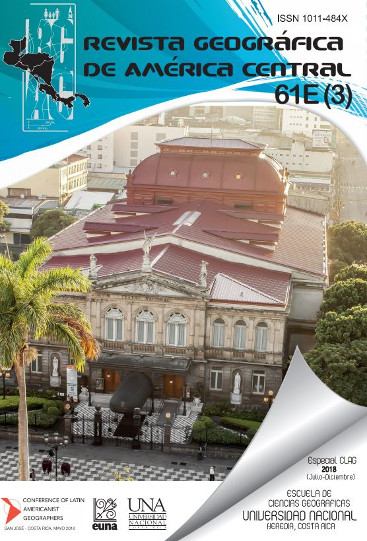The main consequences of solid waste on the environment and the health of the population in the municipality of Cabaret-Haiti
DOI:
https://doi.org/10.15359/rgac.61-3.18Keywords:
Solid Waste; Climate changes; Sustainability of the Planet; Recycling; Natural resources.Abstract
Solid waste management for a more sustainable world is always present at world conferences on the environment, and is a strategy to reconcile development with protection of ecosystems, considering that the generation and final disposal of urban solid waste is now a days a of the major problems of modern society. One of the reflexes of this neglect is easily perceived among the population, as in the case of the lack of basic sanitation, which damages beyond the environment itself, human health with contamination of soil, bodies of water, food and quality of the air, implying in numerous cases of diseases. These residues can be financial sources, and can be reused for other purposes, at the same time, can be considered as a danger to the sustainability of the planet. Thus, this article aims to present scenarios of events that have caused environmental changes in the dynamics of land use in Cabaret-Haiti, mainly through the perception of the population on the management of solid waste and the improper disposal of garbage, aiming at preserving and restoring the environmental quality conducive to life.
References
ABNT - Associação Brasileira de Normas Técnicas. ABNT NBR 10004. (2010). “Resíduos Sólidos – Classificação”, 2010.
ALMEIDA, C. M. “Compostagem” Programa de pós-graduação em solos e nutrição de planta. Universidade de São Paulo, Maio de 2008.
ALTAPRESSE “ Cabaret ravagée par Le cyclone IKE, 8 septembre 2008.
AMORIM, R. R. ; OLIVEIRA, R. C. “Análise Geoambiental dos Setores de encosta da área urbana de São Vicente-SP”. Sociedade & Natureza, v. 19, p. 123-138, 2007.
AMORIM, R. R. ; OLIVEIRA, R. C. (2007). “Degradação ambiental e novas territorialidades no Extremo Sul da Bahia”. Caminhos da Geografia (UFU. Online), v. 8, p. 18-37, 2007.
BESEN, G. R. (2011). Coleta seletiva com inclusão de catadores: construção participativa de indicadores e índices de sustentabilidade. São Paulo, 2011. 275p. Tese (Doutorado) – Faculdade de Saúde Pública, Universidade de São Paulo.
CORREIA, Paulo V.D. “Políticas de solos no planeamento municipal”. 2. ed. Lisboa: Fundação Calouste Gulbenkian, Lisboa, 2002. (Série Manuais Universitários).
IBGE – Instituto Brasileiro de Geografia e Estatística. (2008). Pesquisa Nacional de Saneamento Básico, 2008. Rio de Janeiro: IBGE, 2010.
IHSI -- Institut Haitien de Statistique de d’Informatique. “ Les comunes et Villes d’Haiti”. Port au Prince, fevrier, 2010.
Ministère de l’Education Nationale et de la Formation Professionelle (MENFP) (2010). “La formation continue des personnes administratifs, sociaux et de santé”. Port-au-Prince, fevrier 2010.
ONU -- Organização das Nações Unidas. “O problema do lixo: Cidades do mundo produzem mais 10 bilhões de toneladas de resíduos todos os anos”. Brasil, 7 de setembro de 2017.
ONU- Organisations des Nations Unies. (2008). “Cabaret dévasté apres le passage des cyclones Ike e Hanna”. Septembre, 2008.
ONU- Organisations des Nations Unies (2010). ONU et la prévention des risques de catastrophe. Mars, 2010.
Plan d’Investissement de Cabaret (2001). “Plan d’investissent municipal: version proviso ire (PIMVP)” Republique d’Haiti, departement de l’oeust, comune de Cabaret, decembre 2001.
RODRIGUES, J. M. ; SILVA, E.V. ; CAVALCANTI, A. P. B. (0rgs.) (2010). “Geoecologia das paisagens: uma visão geosistêmica da análise ambiental”. Fortaleza: UFC.
Published
How to Cite
Issue
Section
License
Proposed policy for journals offering Open Access
Authors publishing their works in the Journal acknowledge and agree to the following terms:
a) Authors retain the copyrights to their works and guarantee the Journal the right to be the first to publish their works, under the Creative Commons License Attribution-NonCommercial-ShareAlike 4.0 International, CC BY-NC-SA 4.0 International (https://creativecommons.org/licenses/by-nc-sa/4.0/deed.es), which allows others to share works upon complying with the acknowledgment of authorship and mention of the Journal as the original publisher of the work.
b) Authors are permitted to separately establish additional agreements for the non-exclusive distribution of the official edition of the work published in the Journal (for example, authors may desire to place the work in an institutional repository or incorporate it into a book that is to published elsewhere) so long they acknowledgment to recognize the Journal as the original publisher. The aforementioned additional agreements must respect the terms of the non-profit character and sharing philosophy of the original license (CC BY-NC-SA 4.0 International, https://creativecommons.org/licenses/by-nc-sa/4.0/deed.es).
c) Authors are encouraged to archive the post-print or editor/PDF version in Open Access repositories.






 REVGEO is licensed under https://creativecommons.org/licenses/by-nc-sa/4.0/deed.es
REVGEO is licensed under https://creativecommons.org/licenses/by-nc-sa/4.0/deed.es
.svg_4.png)

_(1).png)
_(1)_(1)_(1)_1.png)
(2)(1)(1)(1).png)
